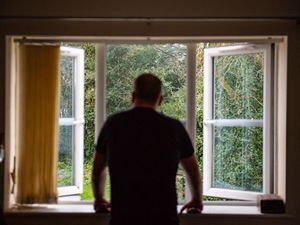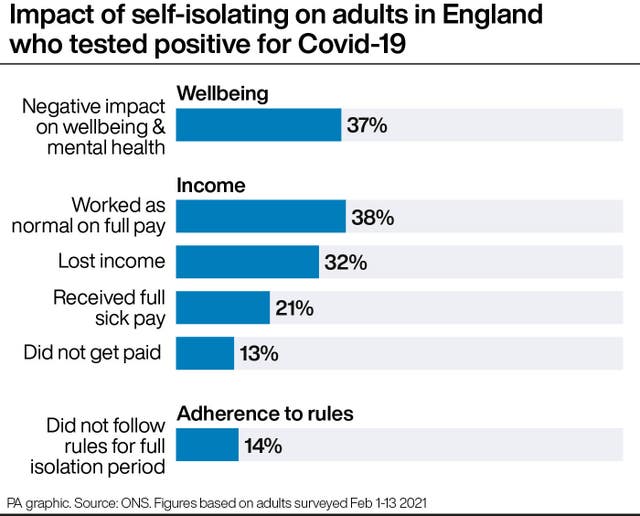Study: 14% of self-isolating adults who tested positive did not adhere to rules
More than one in three adults found self-isolating had a negative effect on their wellbeing and mental health, the ONS found.

Around three in 20 adults in England who tested positive for coronavirus while self-isolating did not fully adhere to legal requirements, figures have suggested.
Some 14% of adults said they had carried out at least one activity during their self-isolation period that did not adhere to the rules, the Office for National Statistics (ONS) said.
Non-adherence with self-isolation requirements is illegal, unless there are exceptional circumstances such as emergency medical reasons.
About one in five (22%) adults who did not adhere to the rules said they had at least one visitor to their home during the self-isolation period, where the visit was not to support personal care.

The ONS analysed responses from adults who had tested positive for coronavirus and who were at the end of their 10-day self-isolation period.
Overall, 86% of respondents reported fully adhering to self-isolation requirements, according to the data collected from February 1 to 13.
The ONS said non-compliant behaviour was most likely to take place between the onset of symptoms and getting a test result.
Half of respondents received their test result within 24 hours and 10% waited more than 72 hours, it said.
Some 98% reported adhering to the requirements in the 24 hours after a positive test and 94% between this point and the end of the 10 days’ self-isolation period.
More than one in three adults found self-isolating had a negative effect on their wellbeing and mental health.
Some 37% of adults said self-isolation had a negative impact while 58% reported no effect.
Around a third (32%) reported a loss of income while 13% of those who had been working prior to self-isolating – either in or outside their home – said they were not paid during the self-isolation period.
Tim Gibbs, from the ONS public services analysis team, said: “Although it’s a legal duty, self-isolation does disrupt day-to-day life and we can see that there are key side effects of self-isolation such as worsening mental health and loss of income.
“Despite this, our analysis shows that a majority of people report fully adhering to the rules throughout their self-isolation period.
“This behaviour is vital in preventing the spread of Covid-19 and keeping people safe.”
Among adults who had to self-isolate after being in contact with someone who had tested positive for Covid-19, around a third (32%) said self-isolation had a negative effect on their wellbeing and mental health, while 28% said they had lost income.
A majority (90%) of those required to self-isolate after coming into contact with a positive case said they had followed self-isolation rules for the entire 10-day period.
Of those who said they had not followed the rules, a third (33%) had allowed at least one visitor into their homes while 22% said they had left home for a medical reason other than getting or returning a Covid-19 test.
These figures, which have also been compiled by the ONS, are based on responses collected from adults in England from March 1 to 6.





